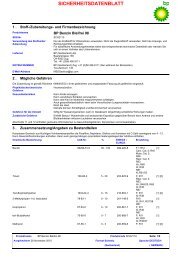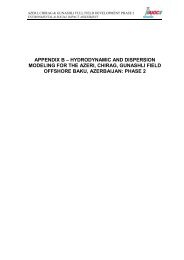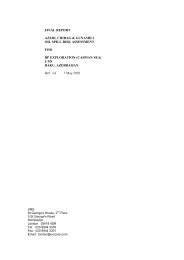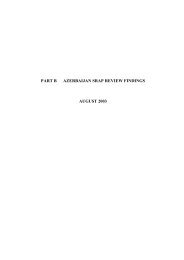Changing diesel cold temp properties using additives - BP
Changing diesel cold temp properties using additives - BP
Changing diesel cold temp properties using additives - BP
You also want an ePaper? Increase the reach of your titles
YUMPU automatically turns print PDFs into web optimized ePapers that Google loves.
FUEL NEWS<br />
CHANGING DIESEL LOW TEMPERATURE<br />
PROPERTIES USING ADDITIVES<br />
Diesel fuel is refined so that its low <strong>temp</strong>erature <strong>properties</strong> are fit for the area and<br />
time it is to be used. However unseasonable <strong>cold</strong> snaps when the <strong>temp</strong>erature<br />
drops below the cloud point of the fuel cause operating difficulties due to wax<br />
dropout.<br />
The cloud point of a <strong>diesel</strong> fuel can normally only be lowered by the addition of a<br />
product with a lower wax content e.g. Heating Oil and similar products.<br />
However by <strong>using</strong> <strong>additives</strong> called <strong>cold</strong> flow improvers it is possible to lower the<br />
<strong>temp</strong>erature at which the wax crystals will block filters (the Cold Filter Plugging Point<br />
or CFPP) and the <strong>temp</strong>erature at which the <strong>diesel</strong> freezes (Pour point). These<br />
<strong>additives</strong> work by changing the size and shape of the wax crystals.<br />
Normally the <strong>cold</strong> filter plugging point is the same as or 1 to 2 °C below the cloud<br />
point while the pour point is 3 to 6 °C below the cloud point. With <strong>additives</strong> it may be<br />
possible to lower the Cold Filter Plugging Point by 1 to 2 °C and much more on the<br />
pour point.<br />
Cold flow improvers can be an alternative to adding heating oil to improve the low<br />
<strong>temp</strong>erature <strong>properties</strong> of <strong>diesel</strong> but the following precautions must be observed.<br />
EFFECTIVENESS<br />
<strong>BP</strong> In-house testing has shown that these <strong>additives</strong> can have only a minor effect on<br />
the <strong>cold</strong> filter plugging point of <strong>diesel</strong> fuels made from the local Bass Strait crudes.<br />
But they will still lower the freezing point and stop problems caused by the <strong>diesel</strong><br />
freezing solid in lines. Additives will not change cloud point.<br />
The In-house testing has shown that they can lower the <strong>cold</strong> filter plugging point of<br />
<strong>diesel</strong> made from imported crude oil by up to 3 degrees even at half the<br />
recommended treat rate.<br />
MIXING<br />
For a <strong>cold</strong> flow improver to work it must be mixed intimately with the fuel so there<br />
must be no undissolved wax present. It should be added to a tank before the fuel is<br />
put in so that mixing takes place. When adding a <strong>cold</strong> flow improver the fuel must be<br />
at least 5 to 10 °C above its cloud point. It will not fix product in tanks that is<br />
showing signs of wax. Pouring it in the top of a tank in which the wax has dropped<br />
out of the <strong>diesel</strong> is a waste of time.<br />
DETERGENCY<br />
Commercially available <strong>cold</strong> flow improvers are often combined with detergents<br />
and other <strong>additives</strong> and sold as fuel conditioners. If such <strong>additives</strong> are used in bulk<br />
tanks the detergent in the additive can strip rust and dirt from tanks which may<br />
lead to reduced filter life for a short time until the tanks are clean.<br />
Issued : February 7, 2002 ADF2102.doc<br />
Supersedes : May 24 2001 Page 1 of 2<br />
<strong>BP</strong> Australia Limited<br />
A.C.N. 004 085 616<br />
Marketing Technical Services
FUEL NEWS<br />
CHANGING DIESEL LOW TEMPERATURE<br />
PROPERTIES USING ADDITIVES<br />
APPLICATION<br />
The <strong>cold</strong> flow improver can be added to vehicle tanks to provide protection when<br />
vehicles are left overnight. It can also be added to bulk tanks but remember to<br />
dewater the tank first to remove loose water and dirt.<br />
SUPPLIERS OF COLD FLOW IMPROVER ADDITIVES<br />
Additives that are claimed to improve <strong>cold</strong> flow <strong>properties</strong> are available from a<br />
number of Commercial Suppliers. A contact for one is supplied below to assist those<br />
who want to use an additive approach for resolving <strong>cold</strong> weather <strong>diesel</strong> problems.<br />
Please note that <strong>BP</strong> does not endorse nor recommend any one particular supplier,<br />
customers should choose suppliers according with their own requirements.<br />
Additive :- ROX DIESEL ANTIFREEZE FUEL ADDITIVE<br />
Supplied by :- National Petroleum Equipment<br />
Freecall 1800 028 283.<br />
Treat rate – Recommended treat rate is 1 litre of additive in 500 litres of <strong>diesel</strong> but we<br />
have found that 1 litre in 1000 litres of <strong>diesel</strong> will lower the <strong>cold</strong> filter plugging point by<br />
3 to 5 °C in <strong>BP</strong> manufactured <strong>diesel</strong>. It will also lower <strong>diesel</strong> pour point (freezing<br />
point) by more than 10 degrees, but It will not change cloud point.<br />
IMPORTANT NOTE – This product also contains a detergent additive so<br />
precautions against dirt and water pickup should be taken by dewatering tanks<br />
before dosing the product.<br />
In terms of its impact on <strong>cold</strong> flow <strong>properties</strong> it is equivalent to the addition of 25%<br />
Heating Oil except it will not lower the <strong>temp</strong>erature at which wax crystals separate<br />
out, it will only modify the crystals to reduce the tendency to block filters.<br />
Application<br />
Ideal where the problem is that fuel is freezing in lines, it will stop the freezing.<br />
Where the problem is wax crystals blocking filter, then its effectiveness may be<br />
limited by crude type. May not be so effective in Victoria and Tasmania due to the<br />
refineries <strong>using</strong> Gippsland crude oil.<br />
For further information, please call the<br />
<strong>BP</strong> Lubricants and Fuels Technical Helpline<br />
1800 033 558<br />
freecall<br />
or visit www.bp.com.au/fuelnews<br />
Issued : February 7, 2002 ADF2102.doc<br />
Supersedes : May 24 2001 Page 2 of 2<br />
<strong>BP</strong> Australia Limited<br />
A.C.N. 004 085 616<br />
Marketing Technical Services


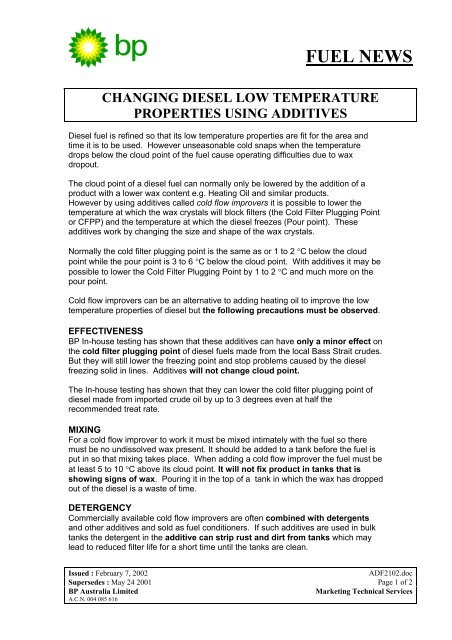

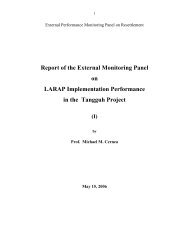
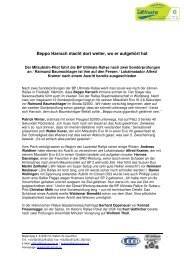
![[PDF] Deepwater Horizon: Accident Investigation Report - BP](https://img.yumpu.com/51697031/1/190x245/pdf-deepwater-horizon-accident-investigation-report-bp.jpg?quality=85)



